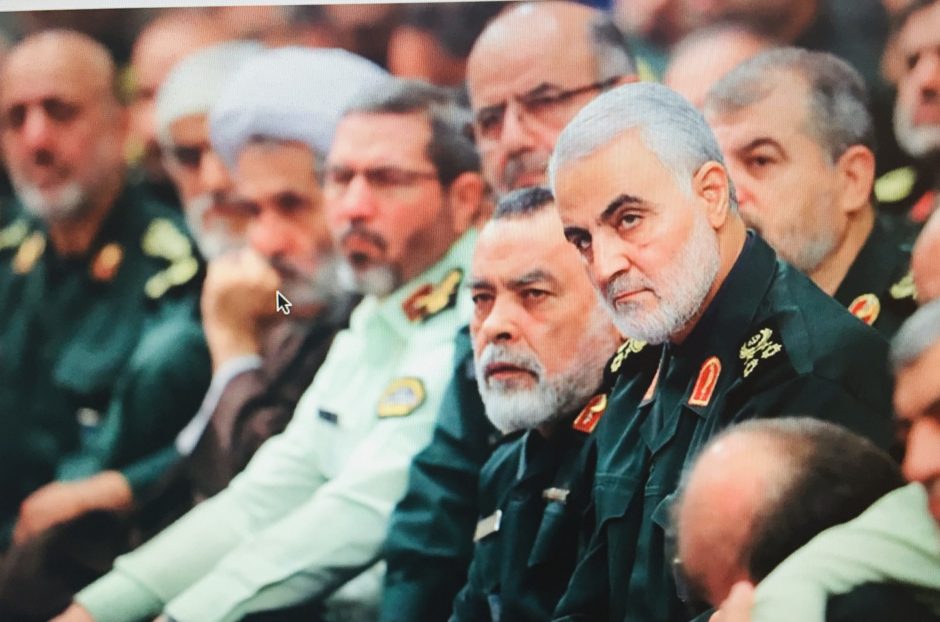Major General Qassem Soleimani lived and died by the sword.
Killed by a U.S. drone strike in the early hours of January 3, shortly after landing at Baghdad International Airport, he was head of the Quds Force, the offensive arm of the Islamic Revolutionary Guards Corps, which aggressively advances Iran’s military and political objectives in the Middle East.
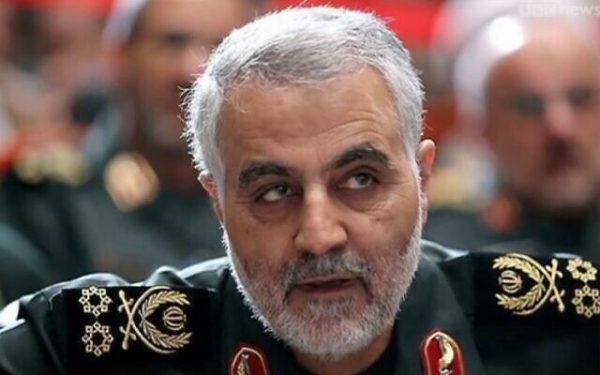
One of Soleimani’s key associates, Abu Mahdi al-Muhandis, the leader of the Popular Mobilization Forces, a coalition of anti-American militias in Iraq which has provided assistance to Hezbollah, died in the attack as well. In recent months, Israel has bombed its bases several times, but has not taken credit for these raids.
Soleimani’s death was a bitter blow to Iran. His mentor, Iranian supreme leader Ayatollah Khamenei, called for three days of mourning and promised retaliation. Declaring that his death “does not end his path or his mission,” Khamenei immediately appointed his deputy, Ismail Ghaani, as Soleimani’s successor.
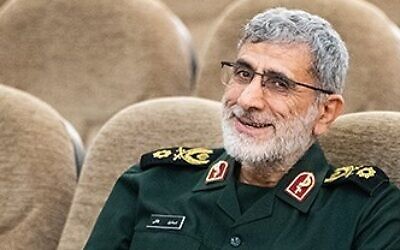
Soleimani, something of a folk hero in Iran and one of the most powerful and important figures in the Iranian regime, worked tirelessly to undermine American interests in the region and destroy Israel.
A cunning and resourceful adversary who devoted himself body and soul to Iran’s Islamic revolution, he was appointed to his position in 1998. Drawing on Iran’s considerable resources, he provided support to the enemies of the United States and Israel — Hezbollah, Hamas, Islamic Jihad, the Popular Mobilization Forces, the Houthis of Yemen, and President Bashar-al Assad of Syria.
But in an ironic twist of fate, he also fought alongside the United States and the Iraqi and Syrian governments in the battle to defeat the Islamic State Organization in Iraq and Syria.
Soleimani’s violent death was the climax of a series of events which have brought the United States and Iran to the brink of open warfare.
The United States broke off diplomatic relations with Iran after Iranian revolutionaries seized its embassy and staff in Tehran in 1979. Throughout the 1980s, Washington backed Iraq in its protracted war with Iran. Since then, tensions have flared periodically. Two years ago, the United States withdrew from the Iran nuclear agreement and imposed crippling economic sanctions on Iran as part of its campaign to exert “maximum pressure” on its Islamic fundamentalist regime.
Last May, Washington accused Iran of masterminding attacks against six oil tankers in the Persian Gulf. After Iran shot down a U.S. drone near the Iranian coast, U.S. President Donald Trump threatened to respond militarily, but pulled back at the last moment. Nor did Trump retaliate after Iran or its proxies struck Saudi Arabia’s Abqaiq oil facility in September.
Late last month, a barrage of rockets struck a U.S. base in Iraq, killing an American military contractor. The U.S. stations 5,000 U.S. troops in Iraq at the invitation of the Iraqi government. It was the eleventh such attack on an American base in the past few years, but the first to cause a fatality. In response, the United States bombed bases in Iraq and Syria controlled by Kataib Hezbollah, a unit of the Popular Mobilization Forces.
These strikes killed 24 of its members, including several commanders, and aroused outrage in Iraq.
Iraqi Prime Minister Adel Abdul Mahdi, who has been struggling to keep nation-wide protests in check, denounced the air strikes as “a violation of Iraqi sovereignty, a dangerous escalation and a threat to the security of Iraq and the region.”
Iraq’s chief Shi’a cleric, Grand Ayatollah Ali al-Sistani, condemned the attacks and warned that Iraq should not become a battlefield for “settling regional and international scores.” Since the U.S. invasion of Iraq in 2003, which unseated the Baathist dictatorship of Saddam Hussein, the United States and Iran have jockeyed for influence in that largely Shi’a Muslim nation.
Within hours of the U.S. air raids, pro-Iranian Iraqi demonstrators converged on the massive U.S. embassy in Baghdad’s Green Zone — the seat of the Iraqi government and foreign embassies — and broke into its compound, damaging a guard post. Tellingly, Iraqi security officials did not try to stop them.
The protesters, in keeping with Iran’s long-standing demand, called for the removal of the U.S. garrison in Iraq. Iraq’s Parliament will address this issue in the coming days, but it’s debatable whether the Iraqi government will go as far as to expel the Americans. Some Iraqi leaders regard the United States as a vital counterweight to Iranian influence, which has grown tremendously in the past 15 years, and depend on the U.S. presence for Iraq’s security and the training of its armed forces.
In the wake of the protests at the U.S. embassy, Trump, having promised to extricate the United States from the “endless wars” of the Middle East, abruptly switched course and ordered 4,750 troops to be dispatched to the region. And he lashed out at Iran, accusing it of engaging in “aggression in the region” and blaming its leadership for orchestrating the demonstration at the embassy. As he tweeted, “Iran will be held fully responsible for lives lost, or damage incurred, at any of our facilities. They will pay a very BIG PRICE! This is not a warning, is is a Threat. Happy New Year!
A day later, U.S. Secretary of Defence Mark Esper warned that the United States would pre-emptively strike pro-Iranian forces in Iraq and Syria should there be indications that further attacks are imminent.
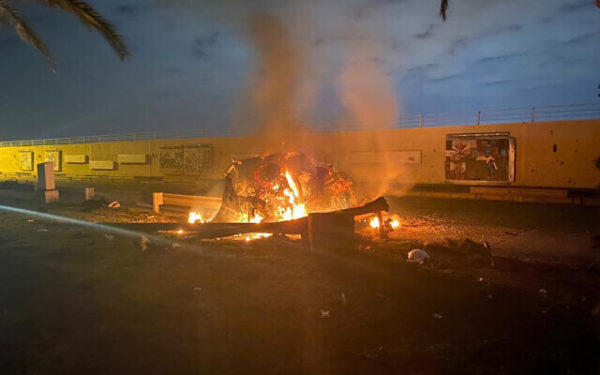
“The game has changed,” he said in a significant comment.
Shortly after his announcement, two MQ-9 Reaper drones fired four missiles at two vehicles leaving Baghdad’s airport, killing Suleimani, Muhandis and eight of their associates.

Trump claimed that Suleimani was plotting attacks on U.S. diplomats and soldiers, but he did not elaborate. The Pentagon said the strike was “aimed at deterring future Iranian attack plans.” U.S. Secretary of State Mike Pompeo described the drone attack as a response to “imminent threats to American lives.”
Israeli Prime Minister Benjamin Netanyahu, who has ordered hundreds of air strikes on Iranian military facilities in Syria, endorsed Soleimani’s assassination: “Qassem Soleimani is responsible for the death of American citizens and many other innocent people. He was planning more such attacks. President Trump deserves all the credit for acting swiftly, forcefully and decisively. Israel stands with the United States in its just struggle for peace, security and self-defense.”
Anticipating Iranian reprisals, Israel placed its forces on alert and closed the ski resort on Mount Hermon, which was struck by Iranian missiles last year.
On January 4, General Gholamali Abuhamzeh, the commander of the Iranian Revolutionary Guard Corps in the southern province of Kerman, Soleimani’s birthplace, implicitly threatened Israel. “Some 35 U.S. targets in the region, as well as Tel Aviv, are within our reach,” he boasted.
As Iran paid tribute to Soleimani and prepared to bury him, he was remembered as the general who targeted U.S. troops in Iraq and created a global network of Shi’a fighters in the service of Iran’s hegemonic foreign policy.
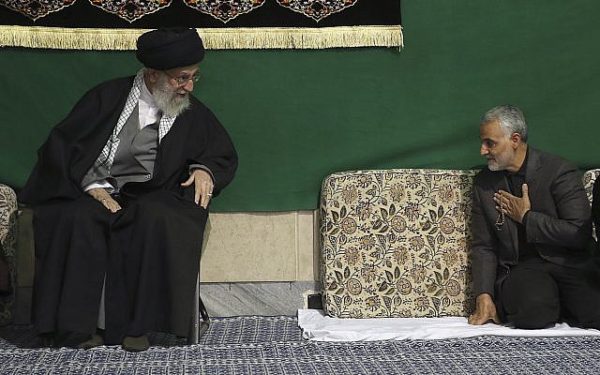
Soleimani, a veteran of the Iran-Iraq War, armed and trained a cadre of Shi’a militias in Iraq who, after 2003, staged an uprising against the American presence in Iraq. By one estimate, these fighters were responsible for the deaths of 600 U.S. soldiers during this bloody insurrection. Soleimani, too, was the chief agent of Iranian political influence in Iraq, and earned the gratitude of many Iraqis by driving Islamic State out of towns and cities it had captured in 2014.
In Syria, a nation convulsed by a civil war, he deployed a foreign legion of upwards of 50,000 Shi’a fighters to shore up Assad’s tottering regime. Much to Israel’s deep concern, he was instrumental in creating a new front against Israel by building a military infrastructure in Syria and a land corridor from Iran to the Mediterranean Sea through which men and materiel can be smuggled.
Soleimani increased Iranian influence in Lebanon through Hezbollah, which emerged following Israel’s 1982 invasion. Iran supplied Hezbollah with missiles and rockets to threaten Israel. In league with Hezbollah’s military commander, Imad Mugniyah, who was assassinated by the United States and Israel in 2008, he played a role in Hezbollah’s guerrilla war to evict Israeli forces from southern Lebanon. His strategy of hitting Israeli defence posts, laying ambushes, placing roadside bombs and killing senior Israeli army officers had the desired effect. In 2000, on the orders of Prime Minister Ehud Barak, Israel withdrew unilaterally from Lebanon, ending an 18-year misbegotten adventure there.
Soleimani assisted the Houthi rebels in Yemen, which has virtually been destroyed by yet another civil war. In this brutal conflict, which has created a humanitarian crisis of the first order, the Houthis face Saudi Arabia, which is backed by the United States.
It remains to be seen how Iran will retaliate for Soleimani’s assassination.
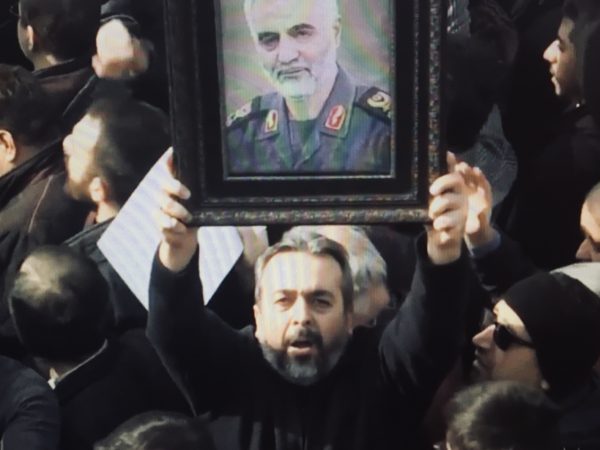
Iran may try to hit U.S. bases in Iraq, Saudi Arabia, the United Arab Emirates and other pro-American states. Alternatively, Iran might launch missiles at oil facilities in the Persian Gulf. Israel, of course, could be a target. Iran, too, might send agents to the United States to wreak havoc.
On another front, Iran may accelerate its nuclear program. Since the United States abandoned the Iran nuclear agreement, Iran has begun to incrementally violate it every two months. Iran may yet restart enriching uranium up to 20 percent, a significant step toward weapons-grade uranium. Iran could also eject inspectors from the International Atomic Energy Agency.
Whatever the case may be, Iran and the United States could be on another collision course, which could well affect Israel sooner or later. Iran’s ambassador to the United Nations, Majid Takht Ravanchi, has called Soleimani’s assassination “an act of war on the part of the United States and against [the] Iranian people.”
His chilling comment could signify that dark days lie ahead in the Middle East.
